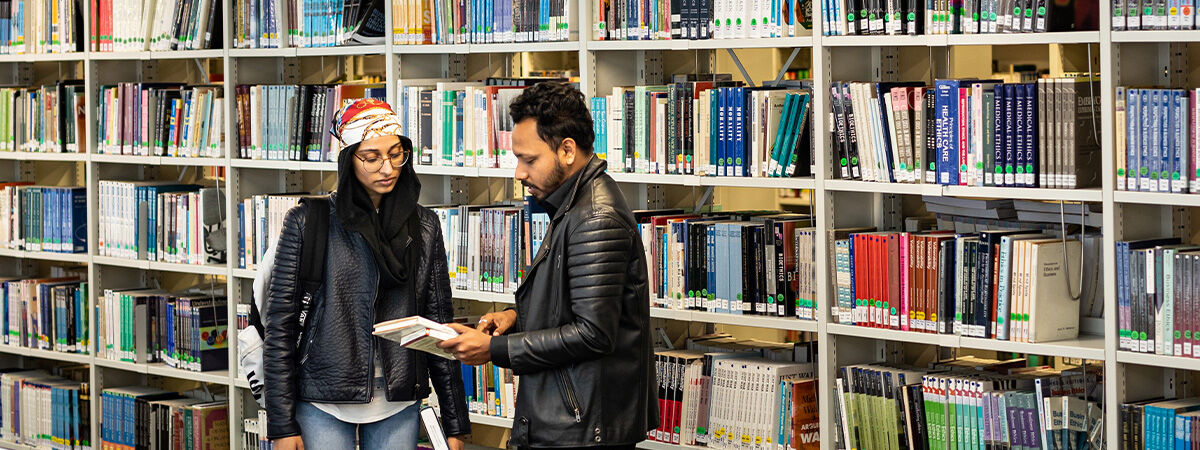Literary Studies
Our Literary Studies specialists publish at the highest level on a very wide range of topics in literary theory, drama and poetics. The research in this cluster intersects many different fields and topics, among them philosophy, art, cultural studies, reception studies, history and music, but also censorship, gender studies, disability studies and translation.

Outstanding impact in this cluster is achieved by Islam Issa’s research on the reception of English literature in the Middle East, for which he was selected as an AHRC / BBC Radio 3 New Generation Thinker in 2017. Issa’s book Milton in the Arab-Muslim World (Routledge, 2016) won the 'Milton Society of America’s First Book Award', while his Milton in Translation (OUP, 2017) won the Milton Society of America’s 'Irene Samuel Memorial Award'.
His groundbreaking work on the Stories of Sacrifice project and exhibition was awarded £97,500 by the Ministry of Defence’s Covenant Fund with matched funding from the British Muslim Heritage Centre. This work has increased public awareness of the role played by Muslim soldiers in the Allied campaign during WWI by revealing that at least twice as many (885,000) fought in the war than had previously been reported.
Stories of Sacrifice won the prize for Research Project of the Year in the Arts, Humanities and Social Sciences at the 2019 Times Higher Education awards, the Muslim News Awards 'Excellence in Community Relations' prize, and the Manchester Culture Awards 'Highly Commended Exhibition'. The project has increased cross-cultural and cross-faith awareness at local, national, and international levels, with the UK Army changing its Diversity and Inclusion strategy as a direct result of Issa’s findings.
We continue to invest in research with an impact on a diverse range of stakeholders, such as the education of students at A-Level and the first two years of undergraduate study. David Roberts’s book Restoration Plays and Players: An Introduction (Cambridge University Press, 2014) was commissioned to meet the needs of undergraduates and is widely used.
His textbook Games for English Literature (Libri, 2016), co-authored with Izabela Hopkins, is a resource for A-Level and first-year undergraduate tutors that derives from work funded by the HEA Innovative Pedagogies programme. Individual staff in each of our research areas are also active in translating research for non-academic and school audiences.
Areas of activity
Our Literary Studies specialists conduct research on a wide range of topics in literary theory, drama and poetics.
These include literary controversy, literary criticism, letter writing and the intellectual, political and imaginative traditions in which literature participates.
Our research covers periods from the 17th century to contemporary literature, for example English romanticism, postcolonial approaches to literature, literary modernism, and the modern-day reception of Early Modern English literature in global contexts.
Our research on poetry investigates the Gothic, eco-criticism, as well as the relationship between poetry, philosophy. Our specialists in drama and theatre studies cover the 17th- and 18th-century Early Modern and Restoration periods as well as modern and contemporary writing for the stage.
Staff working in this group
- Dr Soudabeh Ananisarab
- Dr Joseph Anderton
- Dr Izabela Hopkins
- Dr Tony Howe
- Professor Islam Issa
- Professor Gregory Leadbetter
- Dr Gemma Moss
- Dr Jonathan Potter
- Professor David Roberts
- Professor Philip Smallwood, Emeritus Professor
- Dr Serena Trowbridge
- Dr Rhiannon Cogbill
- Dr Helen Hopkins
- Dr Demi Wilton
Research students
- Helen Hopkins, Literary Studies: International Responses to Shakespeare in the Collections of the Shakespeare Birthplace Trust
- Hassan Hussain, Literary Studies: De/Construction of Gay Men in Twenty-First Century British Theatre: 2001–2016
- Karl Merrick, Literary Studies: Conflicting Voices and Gothic Undecidability in Algernon Charles Swinburne’s Poems and Ballads 1866
- Rosie Whitcombe, Literary Studies: ‘To see her handwriting would break my heart’: The Creation, Containment and Destruction of the Self in the Letters of John Keats